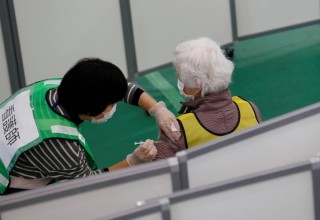Loading
Search
▼ Japan May Delay Covid-19 Timetable For Inoculating Elderly
- Category:Other
Japan plans to start inoculating elderly people only after the coronavirus vaccinations for front-line health workers have been administered, possibly delaying the initially anticipated start date for seniors in April, a senior government official has said.
The move aims to ensure a stable supply of Pfizer Inc.’s vaccine, which was formally approved by the health ministry on Sunday, the official said Monday. Around 3.7 million health workers are to begin receiving the vaccine in March, followed by 36 million people age 65 and older from April 1 at the earliest.
But, according to another government official, it is uncertain when Japan can receive subsequent shipments and how much, following the European Union’s tightening of export controls on vaccines. Pfizer is also likely to delay its plan to increase production capacity from March.
Once a sufficient supply of vaccines has been secured, inoculations could still take place simultaneously for front-line medical workers and the elderly.
After a total of 3 million doses are administered to the general public, Japan will survey the potential side effects caused by various coronavirus vaccines, the health ministry said Monday.
The ministry will invite participants to respond to its survey after the inoculation for the elderly, and plans to track common side effects such as fever and fatigue among three different vaccines, including Pfizer’s.
Around 10,000 to 20,000 health care workers are set to begin receiving their first dose of the Pfizer vaccine on Wednesday. The government will collect and periodically release details about all side effects experienced, regardless of whether the vaccine is the cause.
It will also provide information on the safety of the vaccines garnered from the survey after inoculations begin for the general public.
The survey is expected to cover around 500,000 people per single dose of each version of the vaccine. A total of 3 million doses will be necessary if the government includes doses by pharmaceuticals AstraZeneca PLC and Moderna Inc., alongside Pfizer.
The move aims to ensure a stable supply of Pfizer Inc.’s vaccine, which was formally approved by the health ministry on Sunday, the official said Monday. Around 3.7 million health workers are to begin receiving the vaccine in March, followed by 36 million people age 65 and older from April 1 at the earliest.
But, according to another government official, it is uncertain when Japan can receive subsequent shipments and how much, following the European Union’s tightening of export controls on vaccines. Pfizer is also likely to delay its plan to increase production capacity from March.
Once a sufficient supply of vaccines has been secured, inoculations could still take place simultaneously for front-line medical workers and the elderly.
After a total of 3 million doses are administered to the general public, Japan will survey the potential side effects caused by various coronavirus vaccines, the health ministry said Monday.
The ministry will invite participants to respond to its survey after the inoculation for the elderly, and plans to track common side effects such as fever and fatigue among three different vaccines, including Pfizer’s.
Around 10,000 to 20,000 health care workers are set to begin receiving their first dose of the Pfizer vaccine on Wednesday. The government will collect and periodically release details about all side effects experienced, regardless of whether the vaccine is the cause.
It will also provide information on the safety of the vaccines garnered from the survey after inoculations begin for the general public.
The survey is expected to cover around 500,000 people per single dose of each version of the vaccine. A total of 3 million doses will be necessary if the government includes doses by pharmaceuticals AstraZeneca PLC and Moderna Inc., alongside Pfizer.
The health ministry also said Monday that pregnant women are out of the scope of a law provision obliging citizens to make efforts to receive the coronavirus vaccines.
The decision was made due to a lack of sufficient clinical trial data on the vaccine’s effects on unborn babies. It was endorsed by the ministry’s health council at a meeting the same day.
Under the vaccination law, the coronavirus vaccine inoculation is regarded as an extraordinary anti-pandemic program that does not force people to take part but requires them to make efforts to do so.
Among other decisions at the meeting are that the program will be in place for a year and that vaccination coupons will be sent to all residents age 16 or older.
Expecting mothers can be vaccinated when doctors judge that the advantage of inoculation outweighs the risk.
Nursing mothers will be subject to the obligation to make vaccination efforts. The ministry also decided to allow coronavirus-positive people to get inoculated.
The health conditions of those who have already experienced anaphylactic reactions to vaccines or felt sick due to blood sampling will be monitored for 30 minutes after shots. A 15-minute follow-up will be made for others.
- February 16, 2021
- Comment (0)
- Trackback(0)


